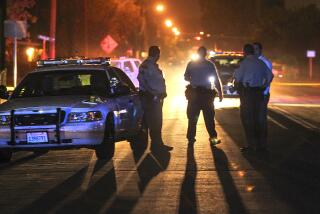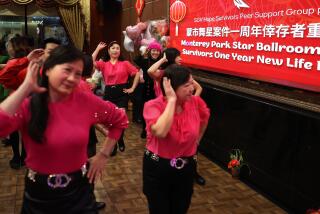For Many, Grief Is a Member of the Family
- Share via
Horace Allen has gotten to know death. All too well.
Allen’s younger brother Joseph was killed in 1992 at 27, the slaying so brutal that parts of the body were left scattered. About a month ago, his older brother James Jr. died from two shotgun blasts to the chest in Texas. Murder, though, had already crept into the Allen bloodline. Their father, James Sr., had been poisoned to death 15 years earlier.
“I’ve seen death so much that I have to have a spiritual foundation to deal with it,” said Allen, of Los Angeles. “It’s like I have to tell myself that when one life ends, another begins.”
Allen was one of about 500 people who stepped out downtown Saturday in the March for Peace, where relatives and friends of people slain mostly by guns remembered their sons and daughters, fathers and mothers. And, sadly, there were others who share Allen’s unimaginable pain. A growing number of families, experts say, are losing loved ones again and again to bullets or other mayhem. They have become experts in mourning.
“I have met with people who say ‘my other brother was killed last year,’ ” said Doreen Archuleta, a “psycho-traumalogist” in the emergency room at St. Francis Medical Center in Los Angeles. “There are lots of families who have dealt with multiple homicides.”
There are no law enforcement statistics that measure the number of these repeat sufferers, but therapists and anti-violence activists who deal with survivors say they have noticed that it is no longer unusual to see violence striking the same family again and again.
For those whose lives have been visited by more than one murder, it is the profound loss that lingers for years, regardless of whether their child or relative was a gang-banger, aggressor or innocent victim.
Therapists and relatives say that parents are the most deeply affected by the constant deaths, realizing that their child, their offering to the future, has beaten them to the graveyard.
“The worst thing that a parent can be able to say is that their child preceded them in death,” said Herman Millholland, of Los Angeles. Archuleta says preventing deaths in the same family must involve counseling the siblings of victims. It’s frightening, she says, to see younger brothers and sisters get caught up in the same gang lifestyle.
The march’s organizer, Lorna Hawkins, could not stop the murders of her two sons.
Her 21-year-old son, Joe, was murdered in 1988 about a block from her Lynwood home. Her other son, Gerald, died when he was shot four times in the back while being chased by suspected gang members in 1992.
To deal with her pain, Hawkins founded a group called Drive By Agony, which organized Saturday’s march. Simultaneous smaller demonstrations by organizations sympathetic to Drive By Agony’s cause were scheduled to take place in Pasadena and Orange County, as well as Missouri, Nevada and Wisconsin. Organizers say the number of march sites indicates that families everywhere are searching for some relief.
Among the downtown marchers was Myrtle Faye Rumph, whose 21-year-old grandnephew Fredrick Brown was killed in a drive-by shooting while standing on a Pasadena street corner in 1985. For Rumph, of Inglewood, the death quickly stripped away the myth that murder only happens to other families.
“We just didn’t think we were the kind of family something like that would happen to,” she said.
Then Rumph’s son, Al Wooten Jr., was killed four years ago. He was shot down, apparently in a random attack, as he walked with a friend in Los Angeles. The day before, Wooten, 35, had started training to become a security guard.
After the second death, Rumph withdrew from life.
“When it came time for the family picnic after my son died, I couldn’t go,” Rumph said. “The pain was so real and fresh that I couldn’t be with my family members. I knew they would be looking at me to see if I was OK. I felt like I would mess up their good time.”
For Kelly Rudiger, the death of a relative also left her detached from the world.
While she was a senior majoring in political science at UCLA in 1988, Rudiger’s 16-year-old brother, Jeffrey, was stabbed to death in a Chuck E. Cheese Pizza Time Theater in San Diego. A co-worker was later convicted of killing Jeffrey.
“After Jeffrey’s death, sometimes I would speed on the freeway and not worry about an accident,” Rudiger said from her Sacramento office. “I felt like nothing worse can happen to me.”
It did.
Four years later, just as things were becoming bearable again, her uncle was found stabbed to death inside his Castro Valley home.
Saturday, Rumph displayed a quilt stitched with the names and faces of her relatives and other victims--a memorial to her son as much as a symbol of her determination to fend off the ghosts of tragedy.
“A lot of people were asking me about the quilt,” Rumph said at the march. “That’s a very real and deep thing to happen. I think the participants in this march want to feel like they have done something for their children. It helps them deal with and grow from their loss.”
More to Read
Sign up for Essential California
The most important California stories and recommendations in your inbox every morning.
You may occasionally receive promotional content from the Los Angeles Times.










